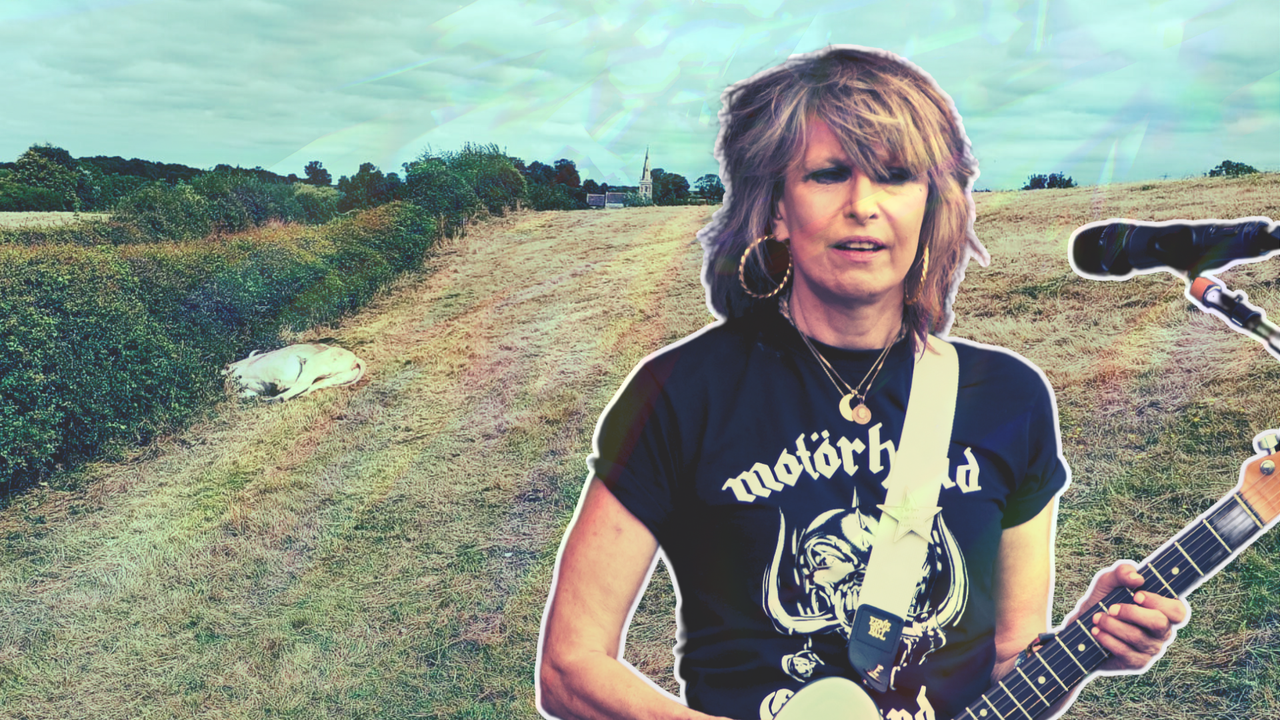
‘I’m horrified’: Chrissie Hynde turns back on ‘ethical’ farm after animal welfare allegations
Ahimsa Dairy Foundation underpaid some workers and left animals to suffer through fatal injury
WARNING: This story contains images and descriptions of injury to animals
An ethical dairy farm backed by Pretenders star Chrissie Hynde has underpaid some of its workers and left some animals to suffer through neglect and fatal injuries, the Bureau of Investigative Journalism (TBIJ) can reveal.
The singer told TBIJ she was “horrified and heartbroken” to hear of the allegations about the Ahimsa Dairy Foundation, and will be withdrawing her support immediately.
Ahimsa claims to offer an alternative to the brutal processes often involved in commercial milk production. It takes its name from the ancient Indian principle of nonviolence and its website says: “Ahimsa farming does not entail any harm to the animals.”
Though it is a small organisation relative to total dairy production in the UK, its humane approach has resulted in glowing press coverage, including claims its farm has “the luckiest cows in the world”.
But insiders allege that behind closed doors, workers and animals are suffering.
“What’s being delivered in practice is something that is probably worse than 90% of the commercial farms out there that they are claiming to be better than,” said John Turner, an organic farmer who provided technical advice to Ahimsa for three years and was paid by the farm for the use of his land.
Photos seen by TBIJ show some of the farm’s cattle with injuries and scars said to be acquired from sharing small spaces with horned animals. Turner and a former staff member say many of the cows and oxen at the farm have at least some scarring or other health issues.
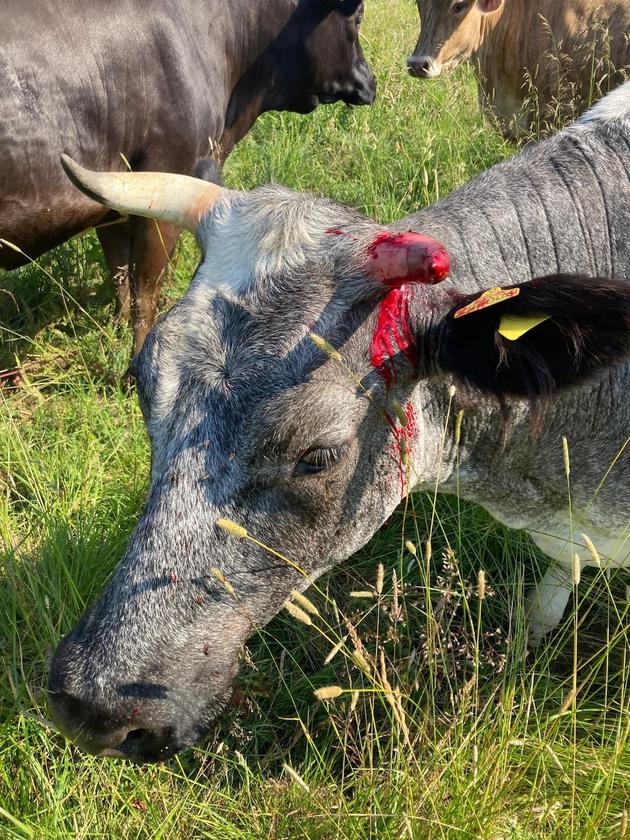 Horned animals have bloodied and scarred others they are kept near
Horned animals have bloodied and scarred others they are kept near
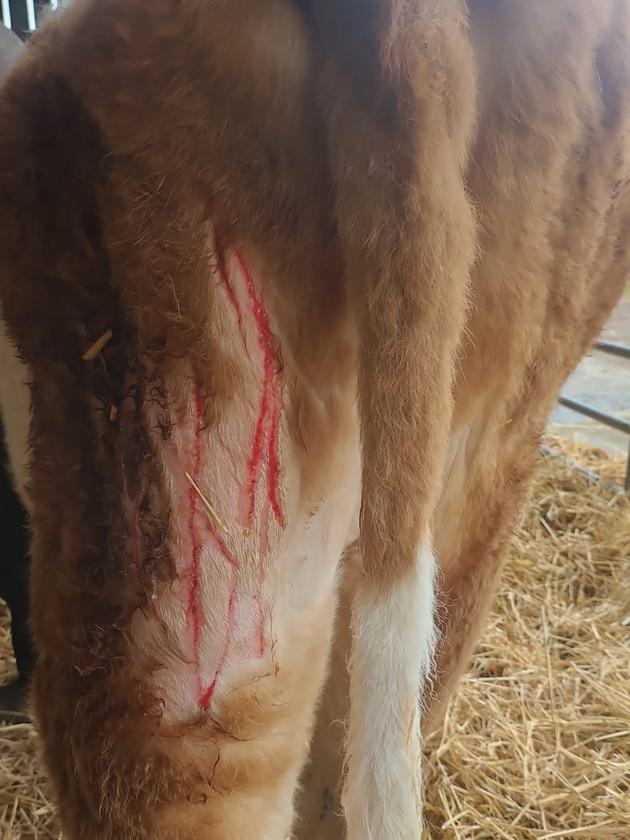
Some of the animals have also been kept in alarmingly unsanitary conditions that put them at risk of disease. Pictures also show animals standing ankle-deep in a mass of manure that covers the length of the barn. Others show mouldy feed and water troughs containing algae.
Many of these practices go against government recommendations for the welfare of cattle, which advise clean living conditions and for animals with horns to be kept apart from those that do not.
The farm has been publicly supported by Hynde, a lifelong vegetarian and animal rights campaigner, who also loaned Ahimsa £1m in 2021.
After hearing of the details uncovered by TBIJ, she said:. “When I last visited the farm, I was not aware of anything untoward taking place. I feel completely let down.
“I was led to believe that the Ahimsa Dairy Farm was the most humane dairy farm in the country. To discover that these abhorrent allegations are true is deeply saddening.”
Ahimsa director Sanjay Tanna told TBIJ that the farm had been regularly visited by the Food Standards Agency, the local council’s environmental health team and the Soil Association, and received no warnings for malpractice. With regards to sanitary conditions he said “there may have been minor issues, but there were no major issues.”
‘It’s cruel’
Turner told TBIJ he had made suggestions to help Ahimsa improve welfare conditions but that they were rarely acted on. At one point he even wrote directly to Hynde.
In another email sent to Ahimsa at the end of 2023, he said low-quality food was resulting in “fights, skirmishes, damaged gates and damaged animals”. He went on to say calves being weaned had been left in confined spaces “with no access to drinking water for a period of between 8 to 12 hours at a time”.
“[This] would be deemed by any inspector or vet as being a serious breach of animal welfare,” he wrote.
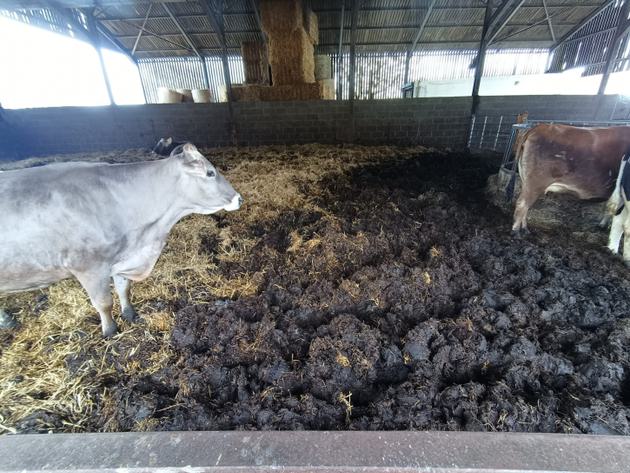 Cattle standing in a barn covered in manure
Cattle standing in a barn covered in manure
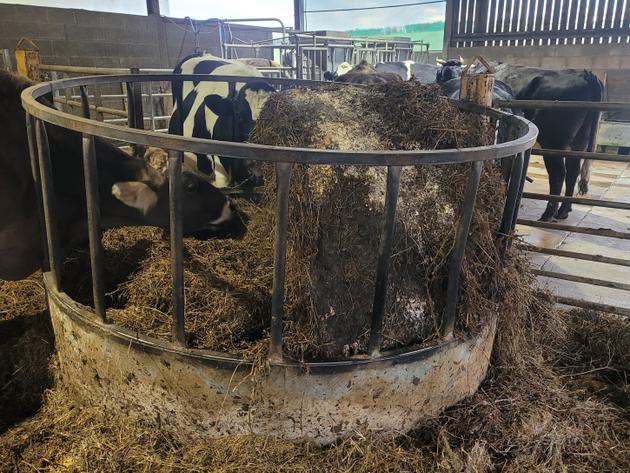 Cows grazing on mouldy feed
Cows grazing on mouldy feed
Despite claims on Ahimsa’s website and bottles that cows are milked by hand, the majority are in fact machine milked. Ahimsa says that it stopped exclusively milking by hand in 2018 and that it was in the process of updating its bottles to reflect that fact.
A veterinarian who visited the farm in a personal capacity told TBIJ she saw milk being drawn from sick animals, including an elderly and arthritic cow.
“Being a dairy cow is like running a marathon … it is so taxing on your body,” she said. “It’s cruel to keep an animal in production for so long.”
The cow in question also suffered regular seizures over the course of some weeks, according to a worker, yet was given no veterinary attention and eventually died.
Sources told TBIJ that there is a general distrust of veterinarians among Ahimsa management, at least in part due to their interpretation of Hare Krishna scripture. Ahimsa's director rejected this suggestion, adding that the farm works closely with vets.
On one occasion in late 2023 an ox that had been mauled was nursing severe injuries for more than two days before vets were called, despite repeated requests by staff. After the vets gave a terminal prognosis, managers then refused to allow it to be put down and the animal went on to die from its injuries.
The vets also called the government’s Animal and Plant Health Agency (APHA), which also recommended euthanisation.
This was not the first time APHA had been called after a terminally injured animal had been denied immediate veterinary care. Vets suggested the farm institute a protocol on putting down dying animals, which Ahimsa agreed to. However, last summer another ox collapsed and the farm hesitated for more than a day before allowing vets to put it down, TBIJ understands.
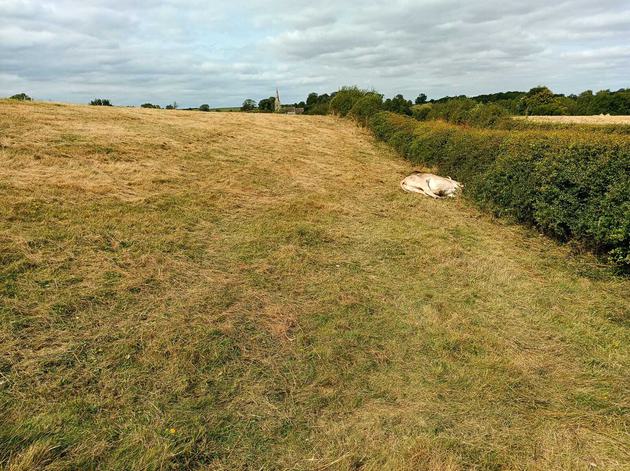 A cow that collapsed on the farm and eventually died
A cow that collapsed on the farm and eventually died
Central to Ahimsa’s brand is the idea of “slaughter-free milk”, which stands against the historical practices of commercial milk production.
Ahimsa’s director told TBIJ that producing milk this way “has been a sharp learning curve and we have made many mistakes and learnt many lessons”.
“We are still trying to navigate through sensitive and emotional areas such as euthanasia and care for sick and dying cows,” he said.
Trading on a good name
There are also serious concerns about how the farm, which posted £1.2m in reserves in 2023, treats some of its workers and volunteers. Yamuna Soto and her partner Shane Gilliland, started working for Ahimsa in late 2022 as part of a project to train working oxen.
She said that as time went by, they realised something was not right. Neither of them had been given a contract and both worked full-time for five or six days a week, including bank holidays. They were each paid just over £1,100 per month – less than the minimum wage – for most of the time they worked on the farm.
“We were put in situations that were less than safe, resources were never given to us to do the job properly and alongside all of that we were paid a pittance for the work that we were doing, which is actually quite skilled work,” said Soto.
The pair contacted their union and eventually reached a settlement totaling nearly £20,000. The farm did not admit liability.
Tanna said that the settlement reached with Soto was not because she was underpaid but was for “voluntary work”.
A spokesperson for Solidarity Across Land Trades (SALT), the branch of the Bakers, Food and Allied Workers Union which supported Soto, said the farm’s donors and customers expect high welfare standards.
“It's not OK that a business can trade on their good name to such a high extent when their workers and animals are being severely mistreated,” they said.
Soto says the farm has not provided all workers with proper health and safety training; and that workers have allegedly been injured on several occasions, with one being gored by a horned cow.
“They never really addressed it,” said Jamie Middleton, 17, who worked at the farm as a volunteer last year “They just said, ‘Oh, well, watch out for her.’ If she’s that dangerous, why are you keeping her in the shed where you've got your volunteers and employees?”
He was charged at by a different horned cow shortly before he left the farm.
Soto says that her concerns about both animals and staff were brushed aside by management.
“The whole way it was set up was horrific,” Soto said. “I got ignored and ignored and ignored.”
Reporter: Emiliano Mellino
Bureau Local editor: Gareth Davies
Deputy editor: Chrissie Giles
Editor: Franz Wild
Production editor: Alex Hess
Fact checker: Josephine Lethbridge
TBIJ has a number of funders, a full list of which can be found here. None of our funders have any influence over editorial decisions or output.







